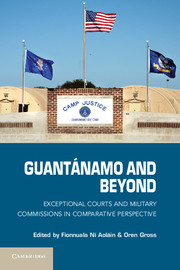Book contents
- Frontmatter
- Contents
- Contributors
- Acknowledgments
- Introduction: Guantánamo and Beyond
- Part I Military Commissions and Exceptional Courts in the United States
- Part II Exceptional Courts and Military Commissions Elsewhere
- 9 The Law Working Itself Pure? The Canadian Experience with Exceptional Courts and Guantánamo
- 10 Vicious and Virtuous Cycles in Prosecuting Terrorism
- 11 Terrorism Prosecution in the United Kingdom
- 12 Trying Terrorists
- 13 Exceptional or Not? An Examination of India's Special Courts in the National Security Context
- Part III International Law, Exceptional Courts, and Military Commissions
- Index
- References
13 - Exceptional or Not? An Examination of India's Special Courts in the National Security Context
Published online by Cambridge University Press: 05 June 2014
- Frontmatter
- Contents
- Contributors
- Acknowledgments
- Introduction: Guantánamo and Beyond
- Part I Military Commissions and Exceptional Courts in the United States
- Part II Exceptional Courts and Military Commissions Elsewhere
- 9 The Law Working Itself Pure? The Canadian Experience with Exceptional Courts and Guantánamo
- 10 Vicious and Virtuous Cycles in Prosecuting Terrorism
- 11 Terrorism Prosecution in the United Kingdom
- 12 Trying Terrorists
- 13 Exceptional or Not? An Examination of India's Special Courts in the National Security Context
- Part III International Law, Exceptional Courts, and Military Commissions
- Index
- References
Summary
HOW IS THE INDIAN GOVERNMENT, UNDER ITS CONSTITUtionally democratic system, dealing with the suspected terrorists that it captures and detains? That is the core question this chapter seeks to address. In Part 1, we offer a brief summary on the structure of the regular Indian criminal justice system. As India's regular courts are considered by many to be broken and incapable of providing justice in a timely manner, the state has opted to construct alternative fora to dispose of criminal matters more expeditiously, including, for our purposes, terrorism-related cases. In Part 2, we provide background on how special courts established under different antiterrorism statutes in India have evolved over the years, including a discussion of the Terrorism and Disruptive Activities (Prevention) Act (TADA) of 1985 and the 2002 Prevention of Terrorist Activities Act (POTA). As we suggest, the special courts under these laws were in fact not so special. Because the lawyers, judges, norms, and even physical facilities were frequently the same as found in the regular courts, there was a great blurring between these two fora. Eventually, both TADA and POTA were repealed, with the latter occurring in the fall of 2004.
In Part 3, we discuss how the 2008 Mumbai terror attacks reignited the call for sweeping measures to be enacted. The result was the passage of two statutes, the Unlawful Activities (Prevention) Act (UAPA) and the National Investigation Agency Act (NIAA), both of which helped establish the most recent set of NIAA special courts, which we analyze in detail. Finally, in Part 4, we outline the challenges these latest courts present to India's democracy. We rely on various cases and data that show a conflation and tension among these NIAA courts, other denoted special courts, the regular judiciary, and India's democratic system of government. We conclude by arguing that in order for special terrorism courts to serve a constructive purpose in India, there must be clarification on the jurisdiction of these fora, which, we believe, would strengthen the government's justification for maintaining such institutions.
- Type
- Chapter
- Information
- Guantánamo and BeyondExceptional Courts and Military Commissions in Comparative Perspective, pp. 283 - 302Publisher: Cambridge University PressPrint publication year: 2013
References
- 1
- Cited by



